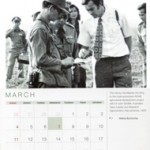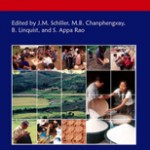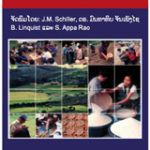-
You are here: Home > Awards > Crawford Fund Medal > Crawford Fund Medal: John Schiller 2012


Crawford Fund Medal: John Schiller 2012

The Crawford Fund honoured John Schiller’s tremendous contribution to agricultural R&D with the awarding to John of a Crawford Fund medal.
Dr John Schiller is an Honorary Research Fellow at the University of Queensland’s School of Agriculture and Food Sciences. John has a distinguished career of outstanding contributions to international development through strengthening scientific capacity in the countries of South East Asia. He lead the education and training program for the Australian Contribution to the Thai National Agricultural Research Program throughout the 1980s, through which about 130 Thai ag scientists gained their Masters and PhDs from Australian universities, and a further 300 upgraded their qualifications. Many of these graduates now hold senior positions in Thai institutions and have helped set Thailand on a path of food security and agricultural prosperity.
John continued his work in Laos, where he was lead rice scientist for 11 years with the International Rice Research Institute (IRRI). John’s linguistic abilities is one of the keys to his success in being able to relate to his colleagues in Asia. John continues his work on capacity building through his current work with ACIAR in Indo China, with the Crawford Fund on short term training courses and through the University of Queensland where he is a patient mentor to many overseas students, especially when it comes to helping them prepare their theses.
Interview with John Schiller
In this short interview, John talks about his work and motivation to develop capacity in South East Asia.
What research areas does your training cover?

My work in Southeast Asia from 1972 until 2001 was primarily focused on the development of research institutional capacity in these countries. In one AusAID supported project in Thailand (1982-1990), I was directly responsible for the ‘human resource development’ component of a large project aimed at improving the capacity of researchers in the Thai Department of Agriculture. The leadership of a Swiss (SDC) project in Laos between 1990 and 2001 (in collaboration with the International Rice Research Institute (IRRI) was also focused on the development of research capacity (on rice) within the country. The involvement in these projects reflects my own personal interest in developing the research capacity and capabilities of young researchers in S.E. Asia (particularly Laos and Cambodia).
The area of need that I have more recently been focusing on is biometry. Unlike Australia, neither Laos nor Cambodia have any institutional statistical advisory capabilities.

A second area of training for which CF support has been sought has been in ‘Technical Writing Skills’. Reporting of output within countries developing their research programs and capabilities is important and needed. In the case of Laos, during the late 1990s, Swiss (SDC) support was obtained to establish a Lao Journal of Agriculture and Forestry. The journal is now being published on a regular basis with articles in Lao and English on the internet.
Why is such training needed?
The training is needed as part of the process of ‘capacity development’ for both the national research staff and their related institutions. Without this ‘capacity development’ there is a real danger that the quality of research in national programs will not achieve ‘acceptable international standards’. Similarly, without appropriate ‘reporting’ of research output in ‘local’ national journals, there is a danger of duplication of research and a related lack of awareness of technologies capable of bringing about improvements in agricultural production.
What has been the most important impact from this training?
The most important impact of the training has been an increase in the confidence of local/national researchers and a gradual improvement in the standard of local/national research. The publication of the research locally/nationally, has also resulted in greater recognition of the research capabilities of national researchers.
How did you first become involved with the Crawford Fund?
I have been aware of the Crawford Fund for many years but the first actual direct link was in October 2009 when I lodged an application to bring two Cambodian researchers to Australia to visit The University of New England, University of Queensland, CSIRO and representative cattle production areas in Southeast Queensland.
Why have you maintained your commitment for so long?
My work and commitment to research in SE Asia started in 1972. On completing my PhD studies at The University of New England, I had the opportunity of taking up a position of a ‘young research agronomist’ in an AusAID (then AIDAB) supported agricultural development project in Northern Thailand. This represented the start of 30 years of living and working in SE Asia on agricultural development projects. The links with researchers in these countries were/are critical. It takes time to develop links and mutual trust.
My interest in Thailand and later, Laos, has partially reflected my earlier interest in learning the languages of these countries. When starting to work in northern Thailand in 1972, I decided to learn the language. The similarity of the culture and languages in Thailand and Laos, was also reflected in my decision to apply to work in Laos with the IRRI in the period 1990 and 2001.
A legacy of the period in the 1970s working in Northern Thailand is the photograph of the King of Thailand and myself, taken in 1976, which was featured in the Australian Embassy/Bangkok calendar for 2012.
Can you tell us about your most recent work in Cambodia and its impact?
Livestock systems research is receiving increased attention in countries in the Mekong Group. This reflects increasing prices for livestock products associated with increased livestock consumption, particularly in Vietnam, China and Thailand. Improved livestock production is increasingly becoming acknowledged as a means of household income improvement in lower income environments in both the upland and lowland agricultural environments of Cambodia. This is being reflected in increased attention of donor agencies, including ACIAR, in providing support for more livestock production focused research.
Between 8-12 October 2012, a biometrics training course (Experimental Design, Data Analysis and Interpretation in Livestock and Fisheries Research) was conducted at the Royal University of Agriculture in Phnom Penh, with support from The Crawford Fund. There were 32 participants in the course, representing seven universities and agricultural colleges and two national research organisations. The participants also included key research collaborators in current ACIAR supported livestock research projects. The course was conducted by lecturing staff attached to the Faculty of Agriculture of Khon Kaen University (KKU) in Northeast Thailand.
The perceived value of the training course to the Cambodian participants was reflected by 80 per cent of course participants rating the course as ‘very good’, with the remaining 20 per cent rating it as good. A by-product of the training course was the development of close links between senior staff of the Royal University of Agricultural and KKU, which are expected to facilitate future collaboration.
What would you say to other researchers thinking of getting involved as trainers?
It is critical to fully appreciate the needs and constraints of local research staff. A major constraint in countries like Laos and Cambodia is a lack of ready access to experts/advisors in their own country. Researchers need to have ongoing access to experts/advisors, rather than just during a period of training. Local capacity development is an important component of any training initiative.


